Daniel Pipes remembers his father in a touching tribute
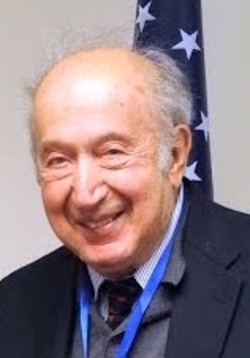 Richard Pipes in 2010. |
His life of drama and accomplishments is recounted both in an autobiography, Vixi: Memoirs of a Non-Belonger(2003) and in a forthcoming intellectual biography by Prof. Jonathan Daly of the University of Illinois. I should like to complement those books by briefly relating the stages of his life, then offering some personal observations.
That life divided into four eras: Poland, building a career, public intellectual, and senior scholar.
1. Poland, 1923-39
In the small border town of Cieszyn at the very south of Poland by the Czech border, Richard was born in 1923. His father, Marek, was a 30-year-old businessman with a specialty in candies; indeed, one of them, Gala Peter, was the original milk chocolate. His mother, Zosia, was just 21 years old. Herself one of 11 children, she decided that one sufficed for her and she gave Richard her full attention.
Many pictures survive from his childhood and they suggest a modern life that we would recognize almost a century later: work in an office, active social life, car excursions to the countryside, occasional trips abroad for work or vacation.
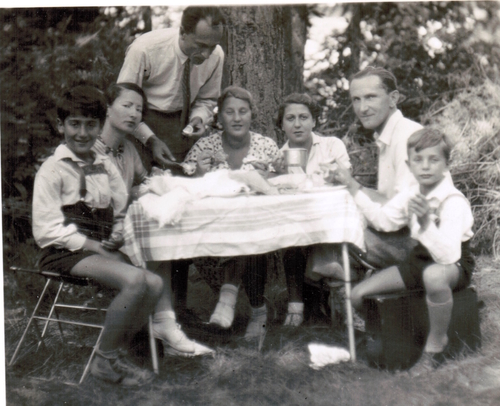 Happy days in Poland: Richard Pipes (far left) with his parents (third and fifth from left) and others at a picnic in 1933. |
The smiling faces and happy activities from that period are the more poignant knowing how, just a few years later, the merriment would come to a tragic end and many of those so cheerfully pictured would be murdered in cold blood.
Indeed, the Pipes family's pleasant life ended abruptly on Sep. 1, 1939, with the German invasion of Poland. But thanks to Marek's initiative and contacts, the three of them escaped Poland by traveling through Germany on forged papers, spending several months in Italy before taking off for Portugal and ending up in New York on Richard's 17thbirthday. Although cognizant of the horrors of war, he did not experience them directly but had an opportunity to spend formative months taking in the arts in Rome and Florence.
2. Building a career, 1940-69
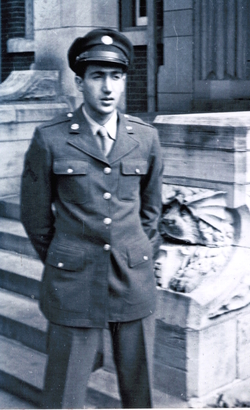 U.S. Army soldier: Richard Pipes in uniform about 1945. |
Coming to the United States meant plunging into a very different culture and language, which my father did with remarkable speed. Some say that he retained a slight accent in English, but I was too accustomed to his speech to hear it.
He served his new country as a soldier, an intelligence specialist in the Army Air Force, and then plunged into academics. The two were related because the army took advantage of his cultural knowledge and linguistic skills to teach him the Russian language, setting him both on the course that would frame his entire professional life and sending him to Cornell University where he met my mother, Irene Roth, in 1944.
On discharge from the army in 1946, Richard married Irene, went to graduate school, and had a child – me – in 1949, followed by a second son, Steven, in 1954.
Immersing himself in Russian studies, he published his first article, "The Russian Military Colonies, 1810-1831," in 1950 and his first book, The Formation of the Soviet Union, in 1954. After some years of anxiety, he won tenure in history at Harvard in 1957 and become a full professor in 1963. During these years, he plunged into teaching undergraduate and graduate students, took up a wide range of scholarly topics, and became, according to his biographer Jonathan Daly, "the most influential" of the scholars who founded Russian historical studies in the United States.
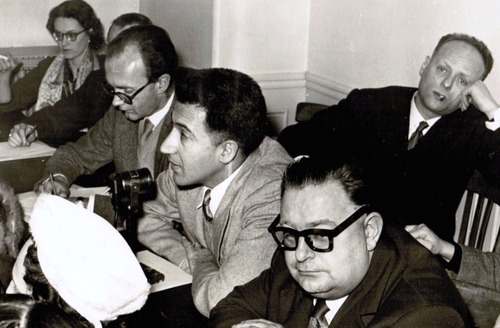 Young academic: Richard Pipes (speaking) at a Congress for Cultural Freedom meeting in Paris in late 1956. |
3. Public intellectual, 1970-91
The third phase, beginning in 1970, had two dimensions. One was scholarly, leaving behind the specialized studies of the previous two decades and embarking on an epic three-part history of the transformation of tsarist Russia into the Soviet Union: Russia Under the Old Regime (1974), The Russian Revolution (1990), and Russia Under the Bolshevik Regime (1994). As an aside, Old Regime was the book dedicated to my brother and me; it was also the only one that I copyedited. Perhaps not coincidentally, it is also my favorite of his books.
These three volumes constitute his chef d'oeuvre, his greatest and his most lasting contribution to the field. They also reached a larger audience and, along with his articles in such publications as Commentary, gave him a public reputation.
The other dimension was political. The year 1970 brought an invitation from Sen. Henry Jackson to testify before Congress, beginning an engagement in the high politics of U.S.-Soviet relations that included developing an expertise in arms control and chairing the "Team B" exercise to assess the CIA's understanding of the Soviet threat.
His political role culminated with a two-year stint in Ronald Reagan's National Security Council, 1981-82. There, he helped bolster the president's instinct to see the USSR not as an eternal presence but as a vulnerable dictatorship that could be bled dry and caused to collapse. The issuance of National Security Decision Directive 75 just as my father left government memorialized and perpetuated that influence.
 Richard Pipes (far right) with (from right) Secretary of Defense Casper Weinberger, U.S. President Ronald Reagan and Secretary of State George Shultz, November 1985. |
4. Senior Scholar, 1992-2018
When the Soviet Union collapsed on Dec. 25, 1991, my father, then 68, saw his nearly 50 years in the field culminate in an extraordinary vindication of his view that the USSR needed to be not contained but defeated.
This world-historic event opened new opportunities; perhaps the most remarkable was his serving as an expert witness at the Constitutional Court of Russia's trial of the Communist Party of the Soviet Union. It was also a time when he received many honors, including the National Humanities Medal in 2007, bestowed by President George W. Bush.
 Richard Pipes being honored by President George W. Bush with the National Humanities Medal in November 2007. |
The end of the Soviet Union permitted him to follow his interests in other directions, writing a book titled Property and Freedom (2000), his autobiography, and a book-length article, "Russia's Itinerant Painters." His career apotheosis also permitted a return to more specialized scholarship, which he did eagerly, publishing a number of studies, especially Russian Conservatism and Its Critics (2006).
He continued to write until the publication of his final book, Alexander Yakovlev: The Man Whose Ideas Delivered Russia from Communism, in 2015, 61 years after his first one. His very last publication, "The Sad Fate of Birobidzhan," appeared in the New York Review of Books in 2016, fully 66 years after his first published article. Fittingly, his final words for publication were "the Communist regime's many failures." At that point, aged 93, he finally retired and indulged a passion for acrostic puzzles.
Richard and Irene kept going, with minimal changes, to the end, maintaining multiple residences, an ambitious travel schedule, socializing, attending events, and delivering talks. He remained lucid, if increasingly short of memory, until the exact turn of 2018, when an exhausted body and mind gradually failed him.
Appreciation
I should like to add some personal observations.
First, in a memorable phrase in his autobiography, Richard wrote about himself as he crossed the Atlantic for the first time to the United States:
I did not know at all what I wanted to do, but I knew with absolute certainty that it was not making money. I felt that God had saved me from the hell of German-ruled Poland for some higher purpose, or an existence beyond mere survival and self-gratification.
As this suggests, his life was a serious one, filled with purpose, devoted to a higher end. He was philosophical and literary, an educator, a counselor to statesmen. He had, and took, a unique opportunity to help frame the American approach to the Soviet Union, an approach that many of his peers scorned but that ultimately was vindicated.
Symbolic of that seriousness, when my mother urged him to shed his tie and jacket as they went for walks in Cambridge, he insisted on formality because, as he put it, he "might meet a student" along the way.
But, second, this seriousness should not be confused with somberness. Having defied Hitler, he felt he had a "duty to lead a full and happy life," and so he did. My father cracked jokes almost with a comedian's timing and his anecdotes attracted huddles at parties. He enjoyed silly television shows (the BBC's Keeping Up Appearances was a favorite) and adored Greta Garbo from afar. He skillfully regaled children and grandchildren with imaginative bed-time stories about Max and Moritz and other tales. He was an oenophile and a connoisseur of the arts, especially classical music, and he collected the complete Fifty-three Stations of the Tōkaidō of Japanese ukiyo-e artist Hiroshige.
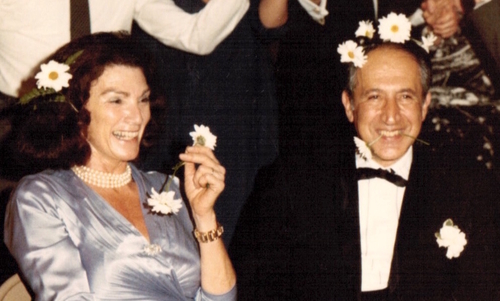 Richard and Irene Pipes in May 1982. |
Third, Richard was very much a married man, living almost exactly one-quarter of his life a bachelor and three-quarters as a husband. This 72-year-long marriage – by my calculation, only one in 10,000 marriages reaches that landmark – provided him with security, stability, and satisfaction. Their many differences, however, made him and my mother an interesting couple. Those differences, I will not pretend otherwise, led to a fair number of squabbles over the decades. Their four grandchildren, who had the luxury of not taking these seriously, would pull out the virtual popcorn when the Richard-and-Irene show began. Some of us in the family speculated that these face-offs, often impassioned, helped keep my parents fit and alert into their 90s.
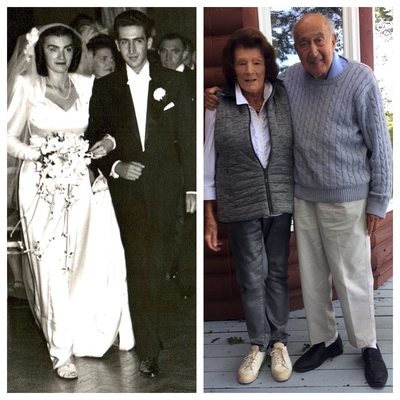 Left: Wedding day, Sep. 1, 1946. Right: 71st and final anniversary, Sep. 1, 2017. |
Nevertheless, these two discordant characters somehow fitted together. Quoting Vixi:
We complemented each other perfectly: to paraphrase Voltaire, she assumed command of the earth, I of the clouds, and between us, kept our little universe in good order. Her charm, beauty, and joie de vivre have never faded for me.
My marriage was for me a continuous source of joy and strength. In a book which I dedicated to her after we had celebrated our golden wedding anniversary I thanked her for "having created for me ideal conditions to pursue scholarship."
Fourth, despite spending 78 years in America, he remained a perpetual European. Appreciate the freedom and individualistic spirit of the United States he did, even while holding to many Old-World sensibilities; for him, the food, wine, music and friends were better over there. Deep human bonds he found more readily with Russians than Americans. Sabbaticals offered an opportunity to live in Paris or London. Indeed, my parents jointly cast so critical an eye on their adopted country that I once, at about the age of 12, righteously castigated them: "If you don't like America, why don't you go back to Europe?"
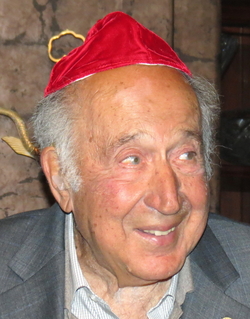 Richard Pipes, Passover, 2013 in Cambridge. |
Fifth, my father was religious in his own way. Raised in a secular Jewish home, a combination of experience and deep reflection brought him to a strong but private and non-ritualistic form of Judaism. His faith was rooted in his life experience, as he explained in Vixi:
Many Jews – my father among them – lost their religious beliefs because of the Holocaust. Mine, if anything, were strengthened. The mass murder (including those that occurred simultaneously in the Soviet Union) demonstrated what happens when people renounce faith in God, deny that human beings were created in His image, and reduce them to soulless and therefore expendable material objects.
To explain his faith, he borrowed an oxymoron coined by the great scholar of Judaism, Harry Austryn Wolfson, and called himself "a non-practicing Orthodox Jew." In practical terms, this meant going to synagogue on High Holidays, not eating bread on Passover, a strong Zionism, and standing up for Judaism in all ways. Jay Nordlinger of the National Review memorably recounts what this meant:
As 1999 turned into 2000, NR published a millennial issue, which included an essay by Pipes. In it, he cited the 1948 book by Henri Frankfort, Kingship and the Gods. He had the "g" in "gods" down, i.e., in the lower case. I put it up, because that's what you do with nouns in a title, no matter what. No, said Pipes, the "g" had to be down: "I am a Jew, and there is one God." With smiles and admiration, I gave in. We published Frankfort's title as "Kingship and the gods" — which was wrong but, at the same time, right.
Sixth, I used the word "private" above in reference to his faith, but he was a private, reserved person in many other ways too. My mother, the social one, brought people into his life by dragging him to parties and hosting events at home. In contrast, my father did not have close friends and remained aloof from his children. He kept his own counsel. In many ways, even those of us who knew him best did not really know him.
Finally, what was it like to be a child of Richard Pipes?
Ever the old-fashioned Mitteleuropa intellectual father, he did not drink milk, play ball, or watch television with his children and grandchildren. He was formal tending to severe, awkward at expressing affection, and kept an emotional distance. Nonetheless, warmth and pride did occasionally and revealingly slip out.
The early years were the simple ones, as when he stopped smoking to honor my birth, told creative bedtime stories, helped me memorize all 48 state capitals, and taught me chess. My teenage years brought the inevitable frictions. But it was, ironically, my being influenced by his example and following in his footsteps to become a historian concerned with current events that created the greatest tensions. He had specific ideas about my career, ideas that I did not always follow. He responded to my deciding in 1969 to take up the study of Islam with, "How will you ever make a living from that?" – wayward advice that I long ribbed him for.
More importantly, he wanted me to follow his career path: Focus on pure historical scholarship, attain tenure, and only then take up current events and government service. When I pre-tenure abandoned the academic track, he was distinctly not pleased. So displeased, in fact, that for many years I semi-joked he was the only person who denied I had a career. Eventually, however, he reconciled himself to my path and even approved of it, as symbolized by his attending my talks and supporting the organization I founded.
 Richard and Daniel Pipes speaking jointly at the city hall in Richard's home town of Cieszyn, October 2014. |
My father titled his autobiography Vixi, Latin for "I have lived." I now say vixit, "he has lived." In all, his was a life well and fully lived, enriching those he encountered while contributing to the world. And, partially defying death, he lives on in his works.